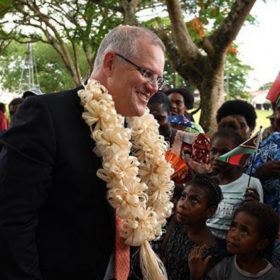
In anticipation of the Pacific Islands Forum (PIF) in Tuvalu this week, Australian Prime Minister Scott Morrison is set to announce A$500 million ($337.75 million) in foreign aid to partnering Pacific nations in the form of a climate change and oceans funding package for renewable energy investment and climate resilience.
The Australian federal government’s reticence in taking meaningful action on climate change and emissions reduction has come under fire from leaders of neighboring Pacific nations in the lead-up to this week’s Pacific Islands Forum.
Frank Bainimarama, the prime minister of Fiji, appealed to Australia “to do everything possible to achieve a rapid transition from coal to energy sources that do not contribute to climate change.”
The funding package to be unveiled by Morrison at the forum redirects existing foreign aid funding to help Pacific nations to invest in renewable energy and climatic event resilience. This package builds on the A$300 million designed for that purpose already between the years 2016-20.
The government has also promised A$140 million from the aid budget for the Australian Private Sector Mobilisation Climate Fund, in an effort to stimulate private sector investment into low-emissions technology for the Pacific and Southeast Asia.
“The Pacific is our home, which we share as a family of nations,” Morrison said. “We’re here to work with our Pacific partners to confront the potential challenges they face in the years ahead.”
Doing very little on climate change at home while providing aid to smaller nations may seem to be somewhat unusual. But there’s a geopolitical element to the aid package.
With limited action in recent years by the Australian government, Pacific nations like Fiji have sought help elsewhere, particularly from China and Russia. Beijing is itself mobilizing large sums of aid to the region as the burgeoning superpower looks to expand its military presence in the region.
Of course, whether Morrison’s government is redirecting aid out of compassion for Australia’s neighbors on the blue continent, or in an effort to reassert its geopolitical presence in the backyard it has been tacitly ignoring, is of little interest to island nations like Tuvalu and Kiribati – which face imminent existential crises posed by climate change.
It is likely the aid package will do little to satisfy Pacific leaders of Australia’s commitment to their future. It is also doubtful leaders like Bainimarama will be satisfied with anything other than the Australian government changing its behavior from that which has brought on the problem in the first place.
“Put simply,” said Bainimarama, “the case for coal as an energy source cannot continue to be made if every nation is to meet the net zero emission target by 2050.”
When Morrison arrives in Tuvalu on Wednesday for PIF, he will be confronted by local children sitting in a moat of water, symbolizing the existential threat being faced by Australia’s neighbours with sea-level rise as a result of climate change. The first submergence of an inhabited island as a result of sea level rise occurred in late 2006 and more inhabited islands continue to be claimed by sea-level rise in low lying states.
By Blake Matich
Lắp đặt điện mặt trời Khải Minh Tech
https://ift.tt/2X7bF6x
0906633505
info.khaiminhtech@gmail.com
80/39 Trần Quang Diệu, Phường 14, Quận 3
Lắp đặt điện mặt trời Khải Minh Tech
https://ift.tt/2ZH4TRU
Không có nhận xét nào:
Đăng nhận xét